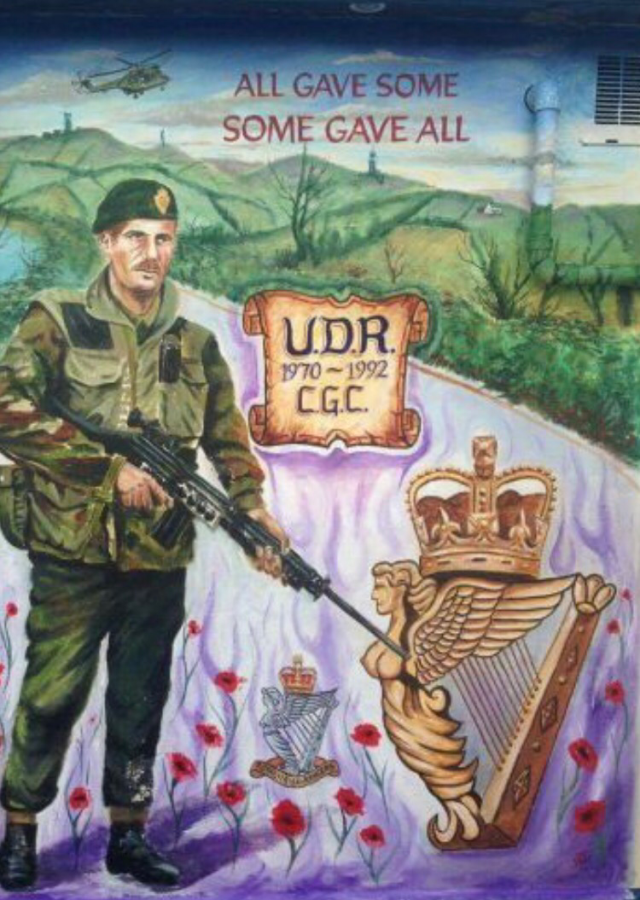By Jamie Bryson

It was George Orwell that said “Who controls the past controls the future. Who controls the present controls the past.” Never has there been a more succinct explanation for the current legacy battle raging within our political institutions (or lack of), the media and our legal system.
Sinn Fein’s narrative would tell you that the legacy block is down to Unionism and the British state. But that is another attempt by Sinn Fein to gain leverage for their political demands. Legacy is a political issue first and foremost; it then becomes a policing issue in terms of investigating within the structures agreed politically. The issue is that due to Sinn Fein’s demands, which are designed to sanitise the IRA’s terror campaign and demonise loyalists and security forces, political progress on legacy is stalling. It is easy for Sinn Fein to create the situation to blame the vacuum that then exists on the British state, but in effect the truth is that due to the one sided nature of Sinn Fein’s demands only a fool would accede to a legacy process on their terms.
The legacy battle is simultaneously being fought across politics, the media and legal system, and lines between the three are becoming blurred.
The legal system is taking over the political system. It is largely a strategy deployed by the liberal left, but it has also been aggressively embraced by the republican community, who have strategically used the legal system in order to litigate the past. What is unachievable politically in terms of re-writing and developing a pro republican narrative of the past, republicans are attempting to achieve via strategic litigation.
Increasingly a coalition of ‘progressives’ are also using this tactic to try and force legislation from the bench on social issues and quite frankly, especially when it comes to the attempts to use the legal system to block Brexit, to subvert our system of democracy and overturn the expressed will of the people.
Let me be very clear, this piece is no criticism of the lawyers engaged on behalf of those pursuing such aforementioned courses of action. I know many of them personally and I know that they are simply representing those that engage them.
If Unionism began to strategically engage the best law firms to litigate the past and challenge collusion with the IRA and atrocities perpetrated against the Unionist community, then I am confident that we would get similarly excellent representation.
Unionist anger around the clearly unbalanced legacy litigation should not be directed at those who are simply litigating on behalf of clients; instead the political objectives behind those engaging our finest lawyers for strategic purposes should be subjected to closer examination.
The legacy vacuum in our political system has allowed the republican strategy of litigating the past in order to adjust the narrative, to try and justify the IRA’s unjustifiable terror campaign, to flourish.
The media has also stepped into the breach and taken responsibility, of their own accord, for investigating cold cases. I have trouble with this on many levels. Firstly, there is a clear imbalance in terms of focusing on the state and loyalists whilst often sanitising the IRA’s terrorism campaign. But there are more serious concerns.
Some of the cold case investigations being carried out by the media, quite often including international journalists, are coming to conclusions and presenting them as facts. They are acting as judge, jury and executioner. We are increasingly seeing programs, books and articles where rather than forensically investigating and reporting the facts, journalism is acting as a non-jury court, weighing the evidence and presenting a judgement. At what stage did we replace the judiciary with kangaroo courts whereby suspects are tried in the media?
As I have alluded too, some of these ‘investigations’ are weighing evidence and presenting findings. What evidence threshold is applied? Where is the appeal mechanism for those found guilty in a trial by documentary?
I believe we have phenomenal journalists in Northern Ireland, but is it their role to step into the legacy vacuum and take responsibility for investigating the past and presenting a judgement? Or to run a case in the form of a documentary or a book, rather than via our long established justice system?
Unionism, in my view, is making the wrong arguments when challenging the media and one sided films and documentaries investigating the past. Rather than simply scratching at the obvious surface points about imbalance, instead Unionism should focus on the much larger point. Who appointed the media to investigate cold cases and present findings? What evidence threshold is applied in a kangaroo court of a documentary? To whom do those found guilty appeal?
This piece has attempted to highlight the underlying reasons why I believe Unionism losing the legacy battle. The way to win is to firstly commence litigating the past ourselves. Get into the fray; if the political system is being taken over by the legal system then let’s make sure we are equipped for the battle in that area.
Let us resist media attempts to fill the legacy vacuum and act as an independent judge, jury and executioner, which investigates the past (as journalism should) but then goes a step further and presents a judgement without any stringent parameters or evidential thresholds being applied.
Unionism must not allow ongoing strategic legacy litigation or the attempted rewriting of the past to continue in such a ferocious manner. It is time to fight back and play the system.
Unionist Voice is currently undertaking a piece of work to establish a working group to assist and provide pathways for those from the Unionist community that want to have historical injustices or republican atrocities investigated, highlighted and if possible litigated.